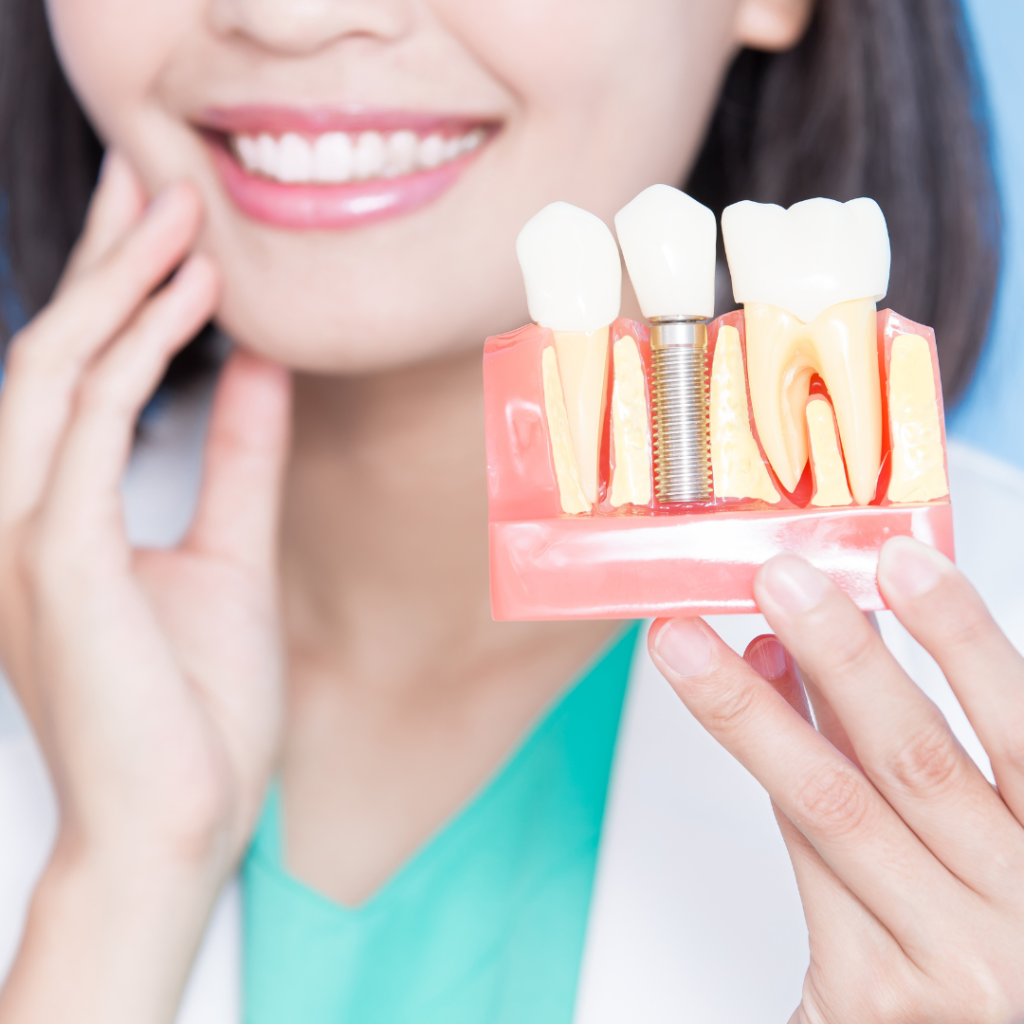Bleeding gums? Find out the causes and effective treatment methods at Astra Dent Warsaw
Bleeding gums are a clinical symptom that signals inflammation of the soft tissues of the oral cavity. Most often, this is gingivitis and periodontitis, caused by bacterial plaque accumulating along the gum line. Bleeding when brushing and chewing is the body's reaction to a chronic infection.
Ignoring the symptoms leads to the progression of the inflammatory process. Over time, the gums separate from the tooth, pockets form, pus accumulates, and periodontal destruction develops (destruction of the connections between the tooth and bone tissue). Pathogenic flora from inflamed tissues enters the bloodstream and causes complications – infective endocarditis, type 2 diabetes, atherosclerosis.
Astra Dent specialists offer comprehensive gum treatment in Warsaw: thorough diagnostics, elimination of the source of infection, strengthening tissues and maintaining oral health in the long term. Timely consultation with a doctor allows you to stop the disease at an early stage and avoid surgical intervention.
Why choose Astra Dent Warsaw for the treatment of bleeding gums?
To eliminate inflammation, full-fledged work with blood vessels, immune response and regeneration is necessary. Treatment at Astra Dent is organized in such a way as not to simply remove the symptom, but to stabilize the patient's condition for a long period.
Advantages of treating bleeding gums at Astra Dent:
- Experienced periodontists. The medical center has doctors with specialized qualifications and practical experience in the field of periodontology. They work with advanced forms of the disease – deep periodontal lesions, tooth mobility, gum atrophy.
- Modern painless treatment methods. Ultrasonic scalers and laser attachments are used in the work for minimally traumatic cleaning of gum pockets. If necessary, local anesthesia is used with the latest drugs with minimal diffusion – the patient does not feel pain even during closed curettage.
- A comprehensive approach to oral health. Treatment includes professional hygiene, stabilization of microflora, individual selection of toothpastes and antiseptics. If necessary, the patient undergoes diagnostics on a digital scanner, which detects changes in the gum relief and foci of inflammation even before the appearance of clinical symptoms.
- Individual recommendations for each patient. After treatment, a periodontist in Warsaw provides a personalized support program: frequency of repeat visits, home care regimen, nutritional advice and load on the periodontium. In cases of systemic disorders (for example, diabetes), he cooperates with a family doctor or endocrinologist.
Astra Dent offers not a point-by-point solution to the problem, but a complete restoration of the functionality and stability of the gums with a view to long-term results.
Why do gums bleed?
Gum recession is a consequence of impaired vascular integrity in the mucous membrane. Normally, they are protected by the epithelium, but under the influence of microbial plaque, inflammation or systemic factors, the barrier is destroyed. It is important to accurately determine why the gums are bleeding. The treatment regimen and the effectiveness of the intervention depend on the root cause.
Bleeding gums – causes:
- Accumulation of dental plaque and tartar. Bacterial deposits are the main source of chronic irritation of the gum tissue. Microorganisms produce toxins that damage the mucosa and cause swelling, capillary fragility and microbleeding. Over time, plaque mineralizes and turns into tartar, which causes the inflammation to deepen.
- Gingivitis is the first stage of gum inflammation. The process is limited to soft tissues without involving the connective tissue of the tooth. The patient notices swelling, sensitivity, bright red gums and regular bleeding during brushing. In gingivitis, invasive intervention is still possible: professional hygiene and local treatment are enough.
- Periodontitis is a complicated form of the disease. Not only the gums are affected, but also the bone tissue that holds the tooth. Deep periodontal pockets are formed, and tooth mobility develops. Bleeding becomes chronic and does not disappear after thorough brushing.
- Incorrect brushing technique. Excessive pressure, a hard brush or horizontal movements can injure the gums. Microcracks open the way for infection and provoke an inflammatory response. This is often observed in patients who change their toothbrush less often than once every 3 months.
- Vitamin deficiency (especially C and K). Ascorbic acid is involved in the synthesis of collagen, which provides strength to blood vessels. A lack of vitamin C leads to fragility of capillaries and slows down healing. Phylloquinone (vitamin K) is needed for blood clotting, its deficiency is manifested by small hemorrhages even without injury.
- Hormonal changes (pregnancy, menopause). Fluctuations in estrogen and progesterone levels change microcirculation in the gums, increase vascular permeability. As a result, tissues become more sensitive to stimuli even with normal hygiene.
- Chronic diseases (diabetes, immune problems). Impaired glycemic control reduces the ability of tissues to regenerate and suppresses local immunity. In such patients, bleeding gums can be a sign of general decompensation, and the dentist is often the first to detect complications.
Astra Dent specialists work in an interdisciplinary approach, taking into account concomitant diagnoses, drug therapy and biochemical characteristics of the body.
What is dangerous about bleeding gums?
If systematic bleeding gums are ignored, the inflammation becomes chronic, disrupting the structure of soft tissues and bone support of the tooth. In most cases, this leads to complications:
- Risk of developing periodontitis. Inflammatory disease of periodontal tissues promotes the reproduction of anaerobic bacteria, which penetrate under the gums and trigger the destruction of the connective tissue of the tooth. Periodontal pockets are formed, in which pus accumulates, and soft tissues lose their ability to regenerate. Thus, gingivitis turns into periodontitis with systemic consequences.
- Mobility and tooth loss. The impact of bone tissue leads to a decrease in its density and the height of the alveolar crest – the part of the jaw in which the tooth roots are located. The tooth loses stability, micromobility appears, which over time turns into loosening. Patients with established periodontitis do not have pain, but teeth can fall out even with chewing load.
- Deterioration of the aesthetics of the smile. Inflammation causes swelling, redness, asymmetry of the gum contours. With atrophy, the necks and roots of the teeth are exposed, and a visual "sag" of the gums appears. As a result, the appearance of even healthy teeth deteriorates, which makes the smile look disharmonious.
- Impact on the general state of health. Chronic inflammation in the oral cavity increases the level of pro-inflammatory cytokines in the blood. There is a proven connection between severe forms of periodontitis and coronary heart disease, stroke, diabetes, arthritis.
Specialists of the Astra Dent center in Warsaw assess the condition of the periodontium, taking into account general risk factors. Consultation with a cardiologist or endocrinologist becomes part of the therapy in complex cases.
How do we treat bleeding gums at Astra Dent Warsaw?
To eliminate bleeding, it is not enough to remove the symptom. It is necessary to remove the source of inflammation, stabilize the microflora, stimulate healing and reduce vascular reactivity. Astra Dent periodontists use a step-by-step protocol that takes into account the degree of damage and the general condition of the patient.
Ultrasonic tartar removal
Dense supragingival and subgingival deposits are mineralized plaque that contains up to 80% of microbial biofilm. It adheres tightly to the enamel and root cementum, which causes gum irritation and provokes a vascular reaction. Ultrasonic scalers with a magnetostrictive or piezoceramic oscillation system are used to remove tartar.
The instrument is equipped with a titanium-coated tip that does not damage the enamel and allows you to work in the area of the tooth neck without the risk of injury. High-frequency vibration destroys the bond between the stone and the treated surface, breaking up deposits.
An integrated irrigation system delivers chilled water or an antiseptic (e.g., chlorhexidine 0.12%) through an internal channel, which provides:
- instant cooling of the tip (reducing tissue overheating);
- washing away plaque microparticles from under the gums;
- reducing the microbial load during tooth treatment.
The procedure is performed with optical control, which allows us to precisely localize the cleaning area. In complex cases (deep pockets, subgingival stones), curved periodontal attachments with an angle of 90° or 120° are used to access hard-to-reach areas.
Deep cleaning of gingival pockets
When the soft tissues around the tooth become inflamed, pathological pockets form – spaces between the gums and the root surface. Normally, their depth is up to 2 mm, but with gingivitis and initial periodontitis it increases to 3-4 mm and accumulates anaerobic bacteria.
To eliminate the infectious focus, the doctor performs closed curettage – professional cleaning of the pockets without incisions.
The treatment process uses:
- periodontal curettes of various configurations (1/2, 11/12, 13/14), which are adapted to the complex anatomy of the root surfaces;
- atraumatic instruments with micro-notch polishing to remove infected cement without traumatizing the tissues;
- antiseptic irrigation of the gingival pockets (0.2% chlorhexidine, ozonated water, hydrogen peroxide), which reduces the bacterial load and reduces swelling;
- local prolonged-acting drugs based on metronidazole or chlorhexidine, which are injected into the pocket at a depth of more than 4 mm;
- application or infiltration anesthesia for patient comfort (articaine or mepivacaine with minimal adrenaline content).
The procedure takes an average of 30-45 minutes and ends with a planned control in 7-10 days. The doctor assesses the healing rate, the absence of bleeding and decides on further supportive therapy.
Antiseptic applications and rinsing
After cleaning, it is necessary to reduce the microbial load and accelerate healing. For this purpose, the following are used:
- chlorhexidine;
- carbamide peroxide;
- ozonated water;
- preparations with silver nanoparticles.
The solutions are injected into the pocket using a syringe with a flexible cannula or in the form of a gel. For home care, an individual rinsing regimen is selected for 7-10 days.
Laser treatment to reduce inflammation
Light energy in the infrared spectrum penetrates deep layers of tissue, reducing swelling and inhibiting bacterial activity. Astra Dent specialists use a laser with a wavelength of 810-980 nm, which has a biostimulating effect and improves microcirculation in the affected area. Laser treatment is used as a complement to classical methods and significantly speeds up the recovery process.
How to make an appointment at Astra Dent Warsaw?
Bleeding gums do not go away on their own – the sooner you start treatment, the higher the chances of avoiding complications. Astra Dent in Warsaw accepts patients with inflammatory dental diseases at any stage. Doctors work with modern equipment and have clinical experience in complex cases.
You can make an appointment in several ways:
- call +48 533 599 552;
- write to info@astradent.pl;
- use the online form on the astradent.pl website.
The appointment does not take much time – the administrator confirms the application quickly, without unnecessary calls and clarifications. You choose a convenient day yourself, and the medical center adjusts to your schedule.

Last update:
28 October 2025, 11:27























